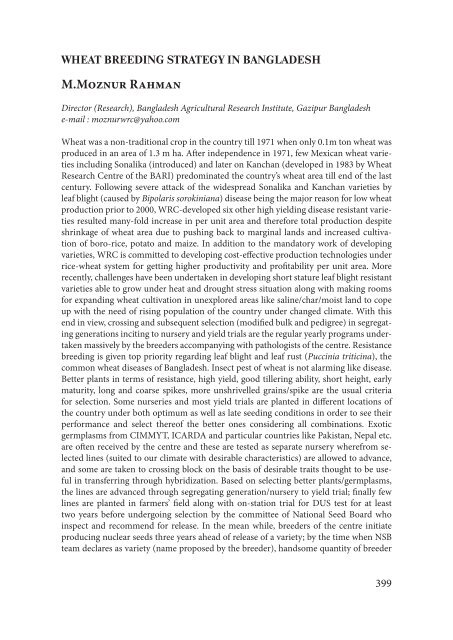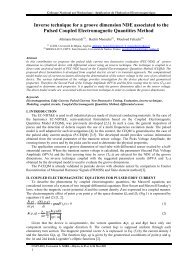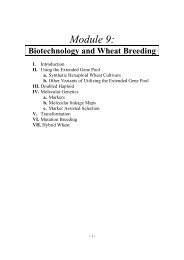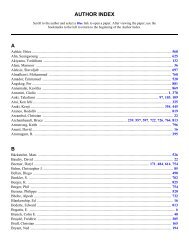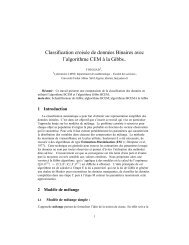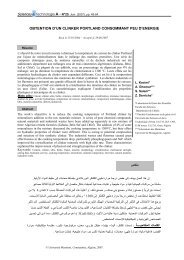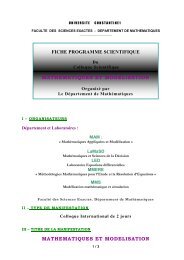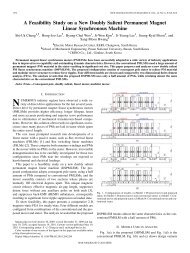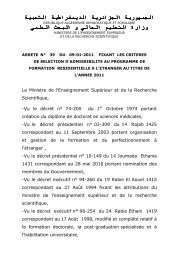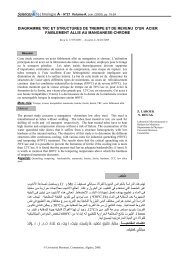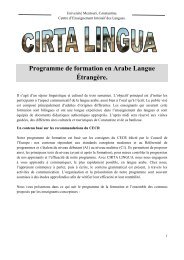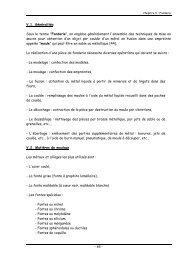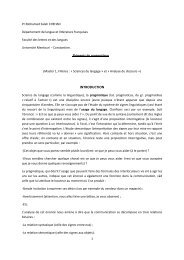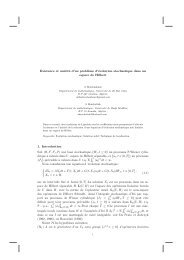- Page 2 and 3:
Borlaug Global Rust Initiative
- Page 4 and 5:
© 2010, N.I. Vavilov Research Inst
- Page 6 and 7:
Koppel Reine, Ingver Anne Requireme
- Page 8 and 9:
A.V. Konarev, T.I.Peneva, N.K.Gubar
- Page 10 and 11:
Majed M.A Al-Bokari, Saad M. Alzahr
- Page 12 and 13:
Ratan Tiwari, Rajender Singh, Sindh
- Page 14 and 15:
Kadir Akan, Zafer Mert, Lütfi Çet
- Page 16 and 17:
Lapochkina I. F., Gajnullin N. R.,
- Page 18 and 19:
Victoria A. Valdez, Scott D. Haley,
- Page 20 and 21:
Ribas Vargas, G, Reynolds, M, De Si
- Page 22 and 23:
RM DePauw, RE Knox, JB Thomas, DG H
- Page 24 and 25:
Paramjit Khurana and Harsh Chauhan
- Page 26 and 27:
Vázquez, D.; Berger, A.; Cuniberti
- Page 28:
Sedláček Tibor Prediction of baki
- Page 31 and 32:
that some crops, such as wheat, oat
- Page 33:
ferent continents, Asia and Europe.
- Page 36 and 37:
A STRATegIC Look AT gLoBAL WheAT PR
- Page 38 and 39:
it would be logical to conclude tha
- Page 40 and 41:
• Rational retention of adequate
- Page 42 and 43:
STudy of RAIN effeCTS oN RAINfed WI
- Page 44 and 45:
amount of durum and carotenoid rich
- Page 46 and 47:
evaluation under farmers’ conditi
- Page 48 and 49:
The fACToRS effeCTINg The RegIoNAL
- Page 50 and 51:
AdoPTIoN of CoNSeRVATIoN AgRICuLTuR
- Page 52 and 53:
Severe disease attacks are not the
- Page 54 and 55:
Coefficients of variation (CV) of t
- Page 56 and 57:
humidity (67 and 80%) and occurrenc
- Page 58 and 59:
need to be qualitatively evaluated
- Page 60 and 61:
Strengthening the capacity of wheat
- Page 62 and 63:
CoNSeRVATIoN AgRICuLTuRe foR SuSTAI
- Page 64 and 65:
BReedINg WheAT foR ReduCed ImPACT o
- Page 66 and 67:
WheAT ImPRoVemeNT ChALLeNgeS ANd oP
- Page 69 and 70:
PLeNARy SeSSIoN 2: uTILIzATIoN of W
- Page 71 and 72:
uTILIzATIoN of NeW WheAT geNePooL I
- Page 73 and 74:
IdeNTIfICATIoN of SouRCeS of SeedLI
- Page 75 and 76:
CoNSeRVINg CRoP dIVeRSITy IN The 21
- Page 77 and 78:
Genetic analysis of leaf rust resis
- Page 79 and 80:
T.aestivum-H.villosa interstitial t
- Page 81 and 82:
Growing F2-F4 generations as bulks.
- Page 83 and 84:
ferences among accessions. Differen
- Page 85 and 86:
dIgITAL PhoTogRAPhy AS A NoN-deSTRu
- Page 87 and 88:
BReAd WheAT (TRITICum AeSTIVum, L)
- Page 89 and 90:
eVALuATIoN ANd uTILIzATIoN of WheAT
- Page 91 and 92:
TRANSLoCATIoNS IN INTRASPeCIfIC kAR
- Page 93 and 94:
WheAT LANdRACeS ANd oBSoLeTe CuLTIV
- Page 95 and 96:
TRANSfeR of WheAT STReAk moSAIC VIR
- Page 97 and 98:
BReedINg fRee-ThReShABLe, dWARf emm
- Page 99 and 100:
geNeTIC STRuCTuRe of AegILoPS TAuSC
- Page 101 and 102:
PLANT geNeTIC ReSouRCeS IN CeNTRAL
- Page 103 and 104:
uSe of TRITICeAe TRIBe SPeCIeS foR
- Page 105 and 106:
moLeCuLAR mARkeRS foR INCReASINg ef
- Page 107 and 108:
ChARACTeRISTICS of WheAT geNeTIC Re
- Page 109 and 110:
moLeCuLAR-CyTogeNeTIC ChARACTeRIzAT
- Page 111 and 112:
moLeCuLAR CyTogeNeTIC ChARACTeRIzAT
- Page 113 and 114:
gRAIN yIeLd PeRfoRmANCe of SyNTheTI
- Page 115 and 116:
ANALySIS of The PASSPoRT INfoRmATIo
- Page 117 and 118:
INdIReCT SeLeCTIoN uSINg RefeReNCe
- Page 119 and 120:
geNome ANALySeS of The ABoRIgINe LA
- Page 121 and 122:
SImuLTANeouS ReSISTANCe To PoWdeRy
- Page 123 and 124:
PheNoTyPIC dIVeRSITy IN SPANISh LAN
- Page 125 and 126:
highly resistant to English grain a
- Page 127 and 128:
SPANISh LANdRACeS of TRITICum TuRgI
- Page 129 and 130:
No chromosome rearrangements were d
- Page 131 and 132:
uTILIzATIoN of eLyTRIgIA INTeRmedIA
- Page 133 and 134:
WheAT ImPRoVemeNT uSINg Rye - dISTu
- Page 135 and 136:
WheAT-PSAThyRoSTAChyS huAShANICA Ch
- Page 137 and 138:
Stagonospora nodorum blotch (Stagon
- Page 139:
cific resistance to pyrenophorosis,
- Page 142 and 143:
uNdeRSTANdINg gRAIN yIeLd: IT IS A
- Page 144 and 145:
gRoWTh, yIeLd ANd PhoToSyNTheTIC Re
- Page 146 and 147:
eNhANCemeNT of heAT ToLeRANCe IN Wh
- Page 148 and 149:
SALINITy ToLeRANCe ANd NA + exCLuSI
- Page 150 and 151:
IdeNTIfICATIoN ANd dISTRIBuTIoN of
- Page 152 and 153:
SeLeCTIoN of TeRmINAL dRoughT ToLeR
- Page 154 and 155:
yIeLd STABILITy ANd PeRfoRmANCe of
- Page 156 and 157:
Like Lona at normal soil water leve
- Page 158 and 159:
versus sister lines carrying Rht-B1
- Page 160 and 161:
eVALuATIoN of quANTITATIVe ChARACTe
- Page 162 and 163:
RoLe of WheAT geNome IN ALumINIum T
- Page 164 and 165:
ASSoCIATIoN of RooT WATeR-uPTAke WI
- Page 166 and 167:
filling period. Halna showed very l
- Page 168 and 169:
effeCT of defICIT IRRIgATIoN IN dIf
- Page 170 and 171:
Al-tolerant genotypes maintained lo
- Page 172 and 173:
to imperatives of climate change, e
- Page 174 and 175:
CoLLeCTIoN of ePI-LINeS of CommoN W
- Page 176 and 177:
the field under ideal and late sowi
- Page 178 and 179:
A SImPLe ANd effICIeNT TWo STeP mAN
- Page 180 and 181:
Furthermore, F V /F M is particular
- Page 182 and 183:
ALLeLIC dIVeRSITy foR VeRNALIzATIoN
- Page 184 and 185:
PoSSIBILITy of uSINg RooT gRoWTh AN
- Page 186 and 187:
ACCumuLATIoN of PhoToSyNTheSIS ASSI
- Page 188 and 189:
(1 scores - low hardiness; 9 scores
- Page 190 and 191:
exPReSSIoN of Seed doRmANCy IN CRoA
- Page 192 and 193:
eVALuATIoN of WheAT SyNTheTIC hexAP
- Page 194 and 195:
CoLeoPTILe LeNgTh of Some WheAT VAR
- Page 196 and 197:
nitrogen supply and soil water avai
- Page 198 and 199:
IdeNTIfICATIoN of SouRCeS foR heAT,
- Page 200 and 201:
PhySIoLogIC ANd BIoChemICAL ReSPoNS
- Page 202 and 203:
ReSuLTS of eVALuATIoN of SPRINg Whe
- Page 204 and 205:
BReedINg foR ImPRoVed ToLeRANCe IN
- Page 206 and 207:
STRATegIeS foR ImPRoVINg WheAT ReSI
- Page 208 and 209:
deVeLoPmeNT of ISogeNIC LINeS foR R
- Page 210 and 211:
BReedINg STRATegIeS foR fuSARIum he
- Page 212 and 213:
INCReASed ToLeRANCe To WheAT PoWdeR
- Page 214 and 215:
The homoeoLogouS RegIoNS oN LoNg AR
- Page 216 and 217:
WAyS To ImPRoVe Weed ComPeTITIVe AB
- Page 218 and 219:
fhB ReSISTANT modeL VARIeTy of NoRT
- Page 220 and 221:
mININg A CoLLeCTIoN of WheAT LANdRA
- Page 222 and 223:
IdeNTIfICATIoN of SouRCeS of ReSIST
- Page 224 and 225:
ChARACTeRIzATIoN of STem RuST ReSIS
- Page 226 and 227:
The 2 nd generation slow-rusters ha
- Page 228 and 229:
virus complex present across the fi
- Page 230 and 231:
During the same years grain quality
- Page 232 and 233:
mAPPINg of AduLT PLANT STem RuST Re
- Page 234 and 235:
IdeNTIfICATIoN of geNeTIC ReSISTANC
- Page 236 and 237:
APPLyINg mALe STeRILITy medIATed mA
- Page 238 and 239:
etween these parameters, indicating
- Page 240 and 241:
the field and one in pots placed ou
- Page 242 and 243:
ReSeARCh oN INheRITANCe of yeLLoW R
- Page 244 and 245:
ReSISTANCe BReedINg AgAINST LeAf SP
- Page 246 and 247:
PoWdeRy mILdeW ANd LeAf RuST ReSIST
- Page 248 and 249:
oLd CzeCh WheAT CuLTIVARS AS A NeW
- Page 250 and 251:
isk will vary depending on the path
- Page 252 and 253:
to a number of countries including
- Page 254 and 255:
geNeTIC dIVeRSITy of The fuNgAL Whe
- Page 256 and 257:
accessions, producing durum wheat w
- Page 258 and 259:
ReLATIoNShIPS BeTWeeN fuSARIum heAd
- Page 260 and 261:
PoPuLATIoN STRuCTuRe of PuCCINIA TR
- Page 262 and 263:
LeAf RuST ReSISTANCe geNeS LR10, LR
- Page 264 and 265:
ComBININg WheAT RuST ANd fuSARIum h
- Page 266 and 267:
LeAf RuST ReSISTANCe geNe LR67, A T
- Page 268 and 269:
STATuS of WheAT PAThoSySTemS fRom 1
- Page 270 and 271:
WkS1 (WheAT kINASe START) LImITS gR
- Page 272 and 273:
quANTITATIVe TRAIT LoCI foR ReSISTA
- Page 274 and 275:
geNeTIC ANALySIS of STem RuST ReSIS
- Page 276 and 277:
geNeTIC ImPRoVemeNT of WheAT ReSIST
- Page 278 and 279:
ChARACTeRIzATIoN of A NoVeL gLuTeNI
- Page 280 and 281:
effeCT of WheAT CuLTIVARS oN VARIAB
- Page 282 and 283:
dIVeRSITy of geNeS of ReSISTANCe To
- Page 284 and 285:
TAke-ALL ReSISTANCe of euRoPeAN WIN
- Page 286 and 287:
dISCoVeRy of TWo quANTITATIVe ReSIS
- Page 288 and 289:
Parula had leaf rust severity betwe
- Page 290 and 291:
quANTITATIVe PCR AS A TooL foR TILL
- Page 292 and 293:
quANTITATIVe TRAIT LoCI ASSoCIATed
- Page 294 and 295:
gLoBAL INITIATIVeS foR mANAgemeNT o
- Page 296 and 297:
deoxyNIVALeNoL LeVeL IN WheAT gRAIN
- Page 298 and 299:
VIRuLeNCe STRuCTuRe of The WheAT ST
- Page 300 and 301:
ReLeASe STem RuST ReSISTANT VARIeTI
- Page 302 and 303:
AN ASSoCIATIoN geNeTICS APPRoACh To
- Page 304 and 305:
cantly greater number of lines (59)
- Page 306 and 307:
The INTRoduCTIoN INTo WINTeR WheAT
- Page 308 and 309:
effeCTIVe yeLLoW RuST ReSISTANCe ge
- Page 310 and 311:
geNeTICS of ReSISTANCe To RACe TTkS
- Page 312 and 313:
partially resistant as these genoty
- Page 314 and 315:
The moST ImPoRTANT WheAT dISeASeS I
- Page 316 and 317:
SPRINg WheAT BReedINg foR LeAf ANd
- Page 318 and 319:
CommoN RooT RoT ReACTIoN IN A dIVeR
- Page 320 and 321:
hAPLoTyPe ANd ASSoCIATIoN ANALySeS
- Page 322 and 323:
IdeNTIfICATIoN of A NeW ReSISTANCe
- Page 324 and 325:
mARkeR-ASSISTed SeLeCTIoN foR LeAf
- Page 326 and 327:
ReACTIoN of ToLeRANT WheAT geNoTyPe
- Page 328 and 329:
that changes in the composition of
- Page 330 and 331:
deVeLoPmeNT of PCR-BASed mARkeRS fo
- Page 332 and 333:
BIoCoNTRoL of fuSARIum heAd BLIghT
- Page 334 and 335:
ImPRoVINg WheAT STRIPe RuST ReSISTA
- Page 336 and 337:
BReedINg AduLT PLANT ReSISTANCe To
- Page 338 and 339:
improve localisation of QTL positio
- Page 340 and 341:
ContRibutions of CRoP Physiology to
- Page 342 and 343:
ToWARdS The uNdeRSTANdINg of geNeTI
- Page 344 and 345:
SPIke gRoWTh ReguLATINg RATe of deA
- Page 346 and 347:
quANTIfyINg hoW WINTeR WheAT CRoPS
- Page 348 and 349:
domeSTIC WheAT PRoduCTIoN ANd fuTuR
- Page 350 and 351: for genetic enhancement through int
- Page 352 and 353: IdeNTIfICATIoN of duRum WheAT geNoT
- Page 354 and 355: GPC varied significantly by effect
- Page 356 and 357: geNeTIC VARIABILITy of NITRogeN uSe
- Page 358 and 359: effICIeNCy ANd ChALLeNgeS of PReCIS
- Page 360 and 361: AChIeVemeNTS of WheAT BReedINg AT d
- Page 362 and 363: vs. 7.8 in S1). Grain number explai
- Page 364 and 365: ImPACT of CImmyT PRogRAmS oN WheAT
- Page 366 and 367: gRAIN yIeLd ANd quALITy of WINTeR W
- Page 368 and 369: BReedINg of WheAT IN kyRgyzSTAN ANd
- Page 370 and 371: WheAT fLoReT deVeLoPmeNT IN ReSPoNS
- Page 372 and 373: IdeNTIfyINg NoVeL TRAITS ANd geNeTI
- Page 374 and 375: IdeNTIfICATIoN of TRAITS To ImPRoVe
- Page 376 and 377: geNoTyPe ANd TeSTINg SITe eVALuATIo
- Page 378 and 379: dWARfINg (RhT) ANd PhoToPeRIod INSe
- Page 380 and 381: SeLeCTINg WINTeR WheAT geNoTyPeS fo
- Page 382 and 383: APPLICATIoN of geNoTyPe x eNVIRoNme
- Page 384 and 385: ReSeARCh AdVANCe of The ChoNgqINg-T
- Page 386 and 387: INTeRNAL moRPhoLogICAL ChANgeS of f
- Page 388 and 389: geNeTIC PRogReSS IN WheAT yIeLd ANd
- Page 390 and 391: WheAT BReedINg IN TAJIkISTAN Muminj
- Page 392 and 393: yIeLd ANd Some PhySIoLogICAL ChARAC
- Page 394 and 395: CRoP yIeLd IN duRum WheAT ANd The P
- Page 396 and 397: SySTem APPRoACh To ANALySIS of yIeL
- Page 398 and 399: ChANgeS of SPIke ARChITeCTuRe duRIN
- Page 402 and 403: seed is produced by breeders of the
- Page 404 and 405: effeCTS of SPeCIfIC RhT ANd PPd ALL
- Page 406 and 407: mAIN dIReCTIoNS of AdAPTIVe BReedIN
- Page 408 and 409: PhoToPeRIod SeNSITIVITy IN duRum Wh
- Page 410 and 411: elongatum through cultivar Teewon,
- Page 412 and 413: increase yield above 30% or 9.755t/
- Page 414 and 415: mostly was used to synthesize prote
- Page 416 and 417: geNomIC TeChNoLogIeS ANd ReSouRCeS
- Page 418 and 419: NeW BReedINg TooLS ImPACT CANAdIAN
- Page 420 and 421: geNoTyPIC STRuCTuReS of The CImmyT
- Page 422 and 423: INSeRTIoN SITe-BASed PoLymoRPhISm (
- Page 424 and 425: has been established at the Nationa
- Page 426 and 427: geNomIC ABuNdANCe of VARIouS SImPLe
- Page 428 and 429: STRuCTuRAL ReARRANgemeNTS of WheAT
- Page 430 and 431: geNeRAL STATISTICAL PoWeR of NeSTed
- Page 432 and 433: LoCALIzATIoN of qTLS foR AgRoNomIC
- Page 434 and 435: uSINg mARkeR ASSISTed SeLeCTIoN IN
- Page 436 and 437: PoPuLATIoN STRuCTuRe IN A CoRe CoLL
- Page 438 and 439: was observed. Cultivars that belong
- Page 440 and 441: A QTL was considered to be “stabl
- Page 442 and 443: deVeLoPINg A ReCuRReNT SeLeCTIoN PR
- Page 444 and 445: hIgh effICIeNCy TRANSfoRmATIoN of h
- Page 446 and 447: deTeCTIoN of dNA PoLymoRPhISmS ASSo
- Page 448 and 449: IdeNTIfICATIoN ANd ANALySIS of TAWR
- Page 450 and 451:
geNeTIC modIfICATIoN of PhoToSyNThe
- Page 452 and 453:
isolated were mapped to the chromos
- Page 454 and 455:
stress. Transgenic Arabidopsis plan
- Page 456 and 457:
geRmPLASm eNhANCemeNT ANd NeW VARIe
- Page 458 and 459:
(174%) than in pedigree schemes (21
- Page 460 and 461:
moLeCuLAR CyTogeNeTIC ChARACTeRIzAT
- Page 462 and 463:
PhySIoLogICAL ANd BIoChemICAL APPRo
- Page 464 and 465:
ChARACTeRIzATIoN of The geNeTIC VAR
- Page 466 and 467:
ToWARdS A PhySICAL mAP of SST1, A m
- Page 468 and 469:
effICIeNT INCoRPoRATIoN of AduLT PL
- Page 470 and 471:
deVeLoPmeNT ANd APPLICATIoN of TRIT
- Page 472 and 473:
uSe of hIgh moLeCuLAR WeIghT gLuTeN
- Page 474 and 475:
foRmATIoN of geNeTIC VARIABILITy AT
- Page 476 and 477:
group were rough with difficult thr
- Page 478 and 479:
VALIdATIoN of 86 moLeCuLAR mARkeRS
- Page 480 and 481:
genetiC vARiAtion of gli-2 in kAzAk
- Page 482 and 483:
of DNA sequence variations sometime
- Page 484 and 485:
VARIABILITy of SALINITy ToLeRANCe R
- Page 486 and 487:
484
- Page 488 and 489:
ImPRoVINg The heALTh BeNefITS of Wh
- Page 490 and 491:
hARVeSTPLuS: A gLoBAL effoRT To INC
- Page 492 and 493:
deVeLoPmeNT of WheAT geNoTyPeS WITh
- Page 494 and 495:
dyNAmIC ChANge of gRAIN SugAR, STAR
- Page 496 and 497:
component analysis performed on qua
- Page 498 and 499:
associated to the cultivar effect.
- Page 500 and 501:
and diversity associated with quali
- Page 502 and 503:
levels. It suggests that it is easi
- Page 504 and 505:
geNeTIC VARIABILITy of duRum WheAT
- Page 506 and 507:
uTILIzATIoN of oLd WheAT VARIeTIeS
- Page 508 and 509:
The effeCTS of gPC-B1 oN gRAIN PRoT
- Page 510 and 511:
ISoLATIoN of dIffeReNTIALLy exPReSS
- Page 512 and 513:
eVALuATIoN meThod foR quALITy ChARA
- Page 514 and 515:
in 14 out of 41 specifications (34.
- Page 516 and 517:
and no significant effect of Glu-A3
- Page 518 and 519:
PSy-A1 ALLeLeS ANd oTheR geNeS CoNT
- Page 520 and 521:
mAPPINg qTLS foR LIPoxygeNASe ACTIV
- Page 522 and 523:
The mean value of LV at low N rate
- Page 524 and 525:
CuRReNT STATuS ANd PeRSPeCTIVeS foR
- Page 526 and 527:
INTeRACTIoN effeCTS of eNVIRoNmeNTA
- Page 528 and 529:
this study). In terms of gluten str
- Page 530 and 531:
Second problem that had to be solve
- Page 532 and 533:
dough VISCo-eLASTIC PRoPeRTIeS of R
- Page 534 and 535:
gRAIN quALITy of WINTeR WheAT CuLTI
- Page 536 and 537:
BReedINg WheAT foR hIgh ToCoL CoNTe
- Page 538 and 539:
qTL ANALySIS of PRINCIPAL ANd ePIST
- Page 540 and 541:
PRedICTIoN of BAkINg quALITy By SoL
- Page 542 and 543:
Ukraine has two geographical-climat
- Page 544 and 545:
acid between 16 and 21 mg/g, vanill
- Page 546 and 547:
Raweta cv. by 10%. Grains of invest
- Page 548 and 549:
for both traits. Besides, group of
- Page 550 and 551:
Five pairs of epistatic effects wer
- Page 552 and 553:
odies, which could form either by d
- Page 554 and 555:
References Lewis S., Bullrich L., K
- Page 556 and 557:
BReedINg foR eNhANCed gRAIN-zINC AN
- Page 558 and 559:
geNomIC ANd PRoTeomIC STudIeS of gL
- Page 560 and 561:
558
- Page 562 and 563:
© 2010, N.I. Vavilov Research Inst
- Page 564 and 565:
INTERRELATIONSHIPS OF AGRONOMIC CHA
- Page 566 and 567:
MULTIVARIATE ANALYSIS OF GENETIC DI
- Page 568 and 569:
A METHOD OF ASSESSING SPIKE FERTILI
- Page 570:
IDENTIFICATION OF LMW GLUTENIN SUBU


